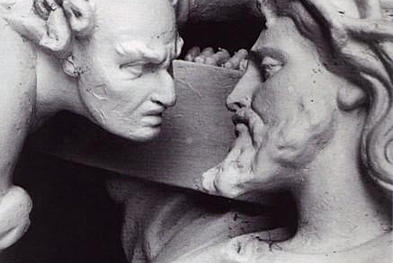March 29,
2015
Isaiah 50:4-9a
Ps. 31:9-16
Philippians 2:5-11
Mark
14:1-15:47
The stark image of the dying Jesus on the cross brought
comfort to medieval Christians in a way that is hard for us to understand. One
faithful Christian, a woman named Julian, who lived and wrote in Norwich, England,
in the 14th century, wrote that she desired three things: to recall Christ’s
passion, to have a bodily sickness, and to have three wounds.
Now we moderns might long for union with Christ, but we
would consider someone who wanted God to wound them and make them sick more
than a little crazy. In 14th century Norwich, life could be described as more
than a little crazy for everyone. Norwich was England’s second largest city, bustling and commercial, with a powerful bishop who assembled all the knights
behind him to wage war against Flanders – and lost disastrously. The plague,
over the course of a generation, killed 5,000 of the city’s 7,000 inhabitants.
And if you dared to speak up against the aristocracy, or to read the bible in
your own native language of English – those two movements were linked – that
same disastrous bishop would have you burned for heresy. The ravaged body of
Christ on the cross made sense to them.
If you were a 14th century Christian, you would know that
God possessed two natures: God was wrathful toward sinners, and loving toward
those who faithfully followed the teachings of the church.
Medieval accounts of Judgment Day present it as a time of
justice, when God’s anger against sin is manifest. [Books and sermons in
England in that time] set out to frighten [people] into virtue by evoking the
event in all its terror, … full of warnings about God’s impatience with his
corrupted creation.[i]
Given that, how else would anyone interpret the devastation
of the plague, as anything except God’s wrath against sinners?
For Julian, who lived much of her life in a small room
attached to a church, this question of sin was the primary puzzle of the
Christian life:
… it seemed to me that if there had been no sin, we should
all have been pure and as like our Lord as he created us. And so … I often
wondered why, through the great and prescient wisdom of God, sin was not
prevented; for it seemed to be that then all would have been well.[ii]
One powerful and difficult strand in Christian theology –
one that is often quoted, and I guess believed, still today -- is that God
demanded the bloody sacrifice of Jesus to atone for the sins of humanity. We
might have been created pure and without sin, but that only lasted a few days
in the Garden of Eden, and we just behaved worse and worse until God sent Jesus
to die for our sins. Extreme Catholics might find expression for this in the
crucifix, but extreme Protestants relish recounting in bloody detail the physical
experiences of Jesus death.
There is not a little contradiction in this theology – and
14th century Julian, writing from a terrifying world where to question
authority might send to your death, points it out clearly: why could did not
God, great and prescient, prevent sin and then all would be well?
If you lay aside, for a moment, this thorny question of the
inevitability of sin, and think about human nature, that disturbing picture of
the dying savior softens a bit. Julian saw in vivid detail, and all of us would
agree, that human suffering is inevitable. We all fall down and get hurt, we
get ill – we don’t have to ask God for these things. They just happen. This
world, where bad things happen, is the world where God placed us. But it is not
the suffering that defines God; it is the love. Julian had visions, in which
she heard Jesus speaking to her from the cross:
‘Would you know your Lord’s meaning in this thing? Know it
well, love was his meaning. Who showed it to you? Love. What did he show you?
Love. Why did he show it to you? For Love.’ … And I saw full surely in this
[she continued in her own words], and in all, that before God made us he loved
us, which love was never slaked nor never shall be. And in love he has done all
his work, and in love he has made all things profitable to us. And in this love
our life is everlasting. [iii]
Or as one very thoughtful scholar put it, “God is not now
one thing, now another – now loving to the saved, now angry to the damned – but
always the same, always love.”[iv]
The death Jesus died was a terrible death, ravaged and beaten,
and, as the Gospel of Mark depicts it, pretty much abandoned and alone. But all
of God’s creatures die, and all of us have some acquaintance with suffering. If
God has created us in love, God loves us to the end, no matter what. No matter
what. All will be well, Julian wrote from a time and place much worse than
ours. All will be well, she wrote, even though people who questioned the
church’s doctrine could be put to death. All will be well, and every manner of
thing will be well.












